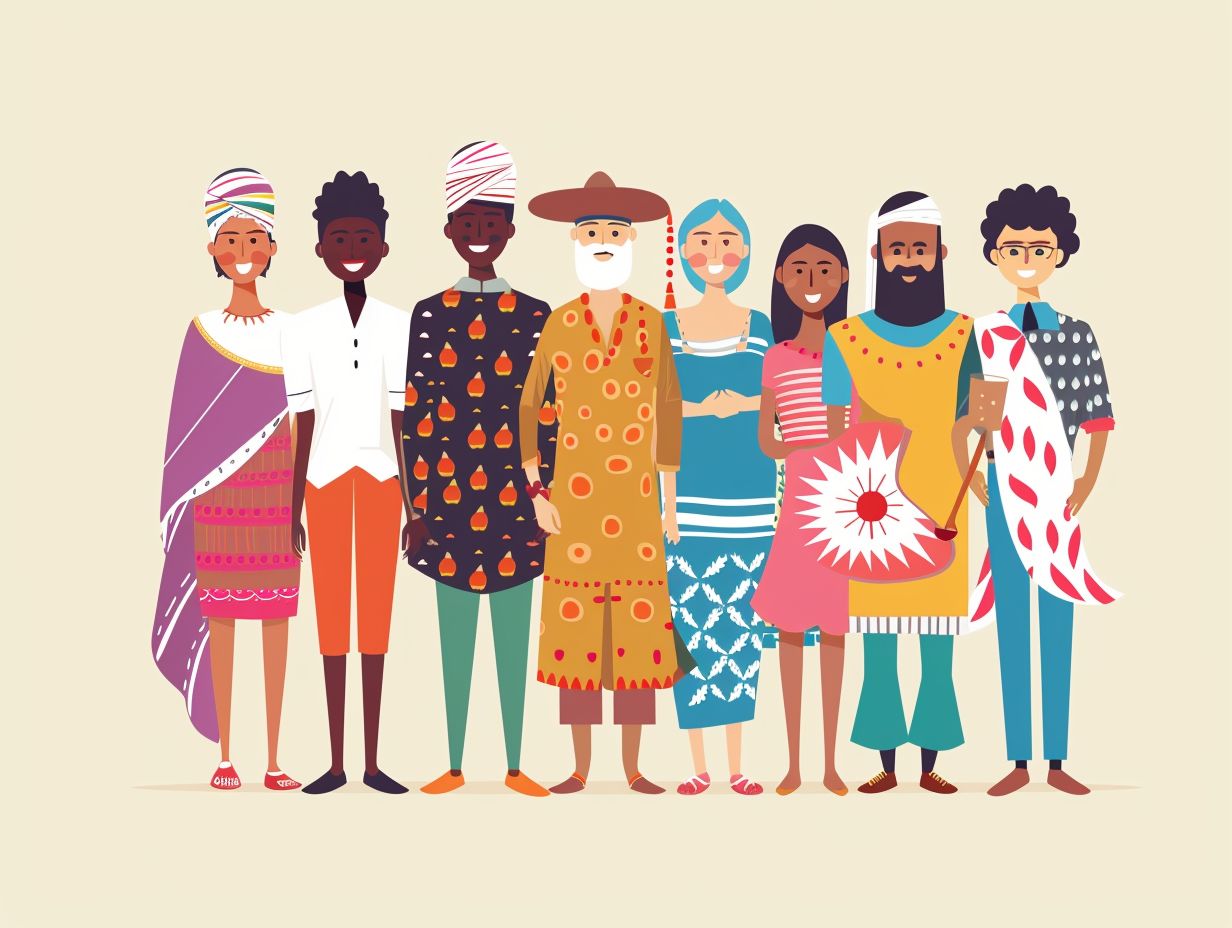Navigating the ins and outs of a new country can feel overwhelming, especially when you’re trying to understand and adapt to American culture as an immigrant.
As an immigrant, you encounter a whole set of challenges as you work to blend into your new surroundings, whether it’s mastering the language or figuring out social norms.
You’re probably facing cultural differences and making adjustments as you settle into life in the US. This article dives into those experiences, offers tips on adapting to US culture, and shows you the perks that come with embracing a fresh way of life.
Defining American Culture

To understand American culture, you need to dive into its diverse mix of values, traditions, social norms, and unique customs that define life in the United States. Whether you’re wandering through lively cities or peaceful countryside, you’ll notice a strong sense of individualism and freedom that’s core to the American spirit. The idea of the ‘American Dream,’ where success is within reach for anyone through hard work and determination, runs deep in the country.
With a population as varied as the United States, you get this melting pot of cultures that leads to a vibrant exchange of ideas and traditions. Politeness and friendliness are pretty standard here, and you’ll often hear greetings like ‘How are you?‘ as a way to show friendliness and reflect the welcoming vibe of American society.
Challenges Faced by Immigrants
As an immigrant in the United States, you’re likely dealing with a variety of challenges. It can be tough to integrate into the community, tackle language barriers, and adjust to cultural differences. But hey, navigating these obstacles is all part of the assimilation journey, which can be complex yet incredibly rewarding.
Cultural Differences and Adjustments
Adjusting to cultural differences involves understanding and respecting new behavioral norms and social etiquette, which can be a significant aspect of your journey as an immigrant in the United States.
For example, in some cultures, eye contact during conversations is a sign of attentiveness and respect, while in others, it might come off as confrontational. You might also come across different attitudes towards punctuality, dress codes, and personal space.
To navigate these differences successfully, you can engage in cultural exchange programs or attend cultural awareness workshops. By actively participating in community events and forming relationships with locals, you can gain valuable insights into the customs and traditions of your new environment, fostering mutual respect and understanding.
Navigating Social Systems
When you’re an immigrant looking to establish a stable and fulfilling life in the United States, knowing the ins and outs of social systems like the legal system, healthcare, social services, and education is key. This knowledge is what opens doors to essential resources and opportunities.
In the legal world, it’s important for immigrants to get familiar with their rights and duties, connect with trustworthy legal experts, and stay in the loop about local laws. Regarding healthcare, signing up for health insurance, finding healthcare providers who understand different cultures, and making use of community health centers are ways to ensure you get quality care. And for education, getting details on school enrollment procedures, English language classes, and financial aid choices can pave the way for educational progress in your new home.
Strategies for Adapting to US Culture

To adapt to US culture, you’ll need to dive into a mix of strategies. Get involved in cultural exchange programs, connect with the community, and keep on learning. That’s how you’ll become a respected and integrated member of American society.
Learning the Language
When you’re an immigrant, tackling language barriers is a crucial step. Getting a good grasp of the language can really boost your communication skills and give you more access to educational opportunities.
Being able to express yourself effectively in English isn’t just about fitting into society – it can also push your career forward. It’s your ticket to better job options, fatter paychecks, and a wider social circle.
If you want to brush up on your language skills, think about signing up for English classes at your local community college or adult education center. These programs usually have a solid curriculum and experienced teachers to guide you along.
Another great idea is to join conversation groups or language exchange meetups. It’s a fun way to practice speaking and listening skills in a relaxed, informal setting.
Understanding Social Norms
To foster inclusivity and mutual respect within the community, it’s important for you to understand social norms and etiquette in the United States.
Get comfortable with common social practices like giving a firm handshake, making eye contact during conversations, and respecting personal space. This way, you can navigate social interactions more smoothly as an immigrant.
Recognizing the importance of being on time, being polite, and respecting personal space can help you, as a newcomer, establish positive relationships with your neighbors and colleagues.
Showcasing your willingness to learn and adapt to American social norms demonstrates a genuine effort towards fitting in and being accepted in the diverse tapestry of society.
Building a Support Network
To navigate your new life in the United States, it’s crucial for you as an immigrant to build a strong support network through community involvement and participation in integration programs.
By engaging with community support systems, you not only get practical help with dealing with bureaucratic processes and finding essential resources but also feel a sense of belonging and connection. Networking within your local community can lead to job opportunities, language classes, cultural exchanges, and new friendships. Integration programs like language courses, job training workshops, and cultural orientation sessions are key in helping you feel more connected and give the power toed in your new environment.
Benefits of Assimilating to US Culture

When you adapt to US culture, you open yourself up to a world of advantages. You’ll find better opportunities, a higher quality of life, a feeling of fitting in, and the chance to hold onto your cultural roots while also embracing new customs.
Improved Opportunities and Quality of Life
When you assimilate into American culture, you can unlock a whole new world of opportunities in the workplace, education sector, and the economy, giving a significant boost to your quality of life.
By embracing the norms and values of American society, you can build connections that lead to exciting job opportunities and career growth. This integration also opens doors to top-notch educational institutions, scholarships, and resources that can help you expand your knowledge and skills. Getting involved in the US economy can bring financial security, business prospects, and a chance to make a positive impact in the community, paving the way for a better lifestyle.
Preserving Cultural Identity
As you integrate into US culture, it’s important for you to hold onto your cultural identity by preserving your heritage and traditions, adding to the diversity within the broader community.
You can maintain your cultural identity by participating in cultural festivals or events that highlight your heritage. Connecting with other immigrants from your background can give you a sense of belonging and camaraderie. Cooking traditional dishes, speaking your native language at home, and practicing your cultural customs are great ways to keep your heritage alive. By embracing and sharing your traditions, you not only enrich your own life but also contribute to the vibrant mix of diversity that enhances the entire community.
Frequently Asked Questions
What is the United States culture and why is it important for immigrants to understand and adapt to it?

The United States culture is a set of beliefs, values, customs, and behaviors shared by the people living in the country. It is important for immigrants to understand and adapt to it in order to successfully integrate into society, build positive relationships, and navigate daily life.
How can I learn more about the United States culture as an immigrant?
There are many ways to learn about the United States culture as an immigrant. You can read books, watch movies and TV shows, attend cultural events, interact with locals, and join community groups. It is also helpful to have an open mind and be willing to ask questions and learn from others.
What are some common cultural differences I may encounter as an immigrant in the United States?
Some common cultural differences you may encounter as an immigrant in the United States include communication styles, social norms, and religious beliefs. For example, direct communication may be more common in the United States compared to other cultures where indirect communication is preferred. It is important to be aware of these differences and adapt accordingly.
How can I adapt to the United States culture as an immigrant?
Adapting to a new culture can be challenging, but there are some steps you can take to make the process easier. These include learning the language, observing social norms, participating in cultural activities, and making an effort to understand and respect the values and beliefs of the people around you.
What are some common misunderstandings immigrants may have about the United States culture?
Some common misunderstandings immigrants may have about the United States culture include the belief that everyone is rich and lives a luxurious lifestyle, that everyone has equal opportunities regardless of their background, and that Americans are individualistic and lack community values. It is important to recognize that these are stereotypes and that the reality may be different.
What are some resources available to help me understand and adapt to the United States culture as an immigrant?
There are many resources available to help immigrants understand and adapt to the United States culture. These include cultural orientation programs, language classes, cultural exchanges, and online resources such as blogs and forums. It is also helpful to connect with other immigrants and learn from their experiences.